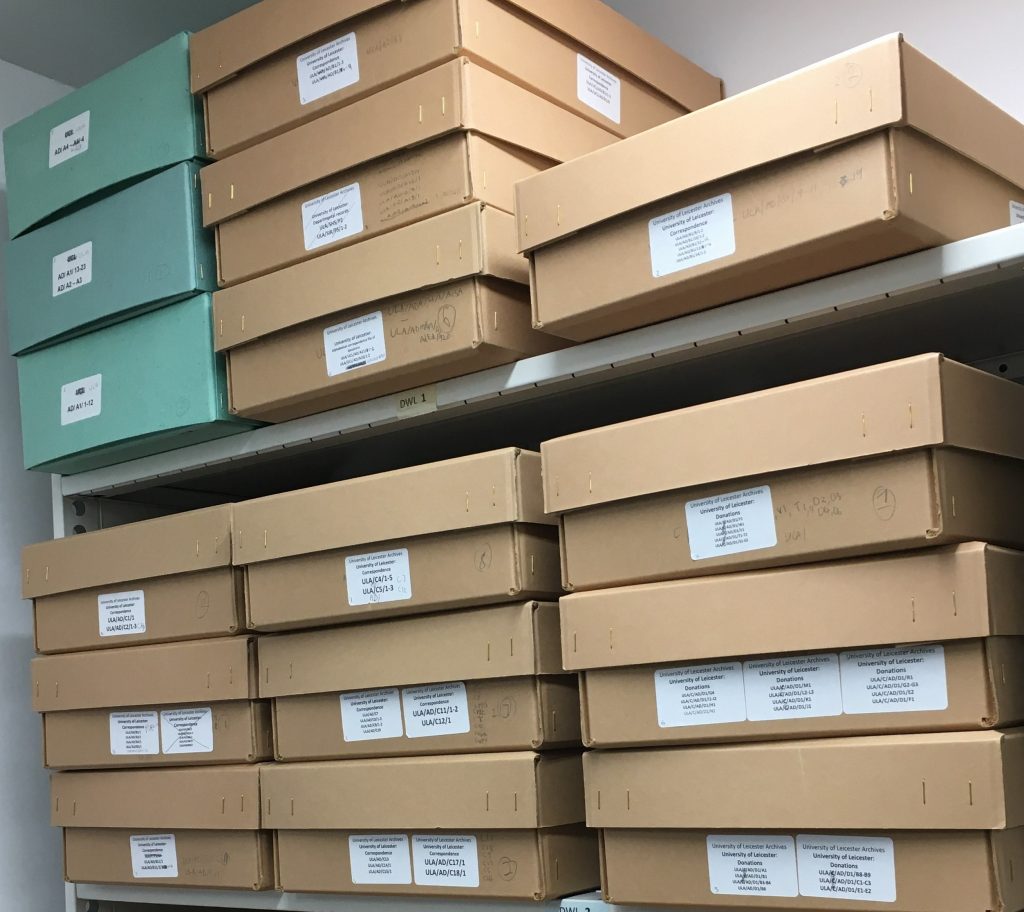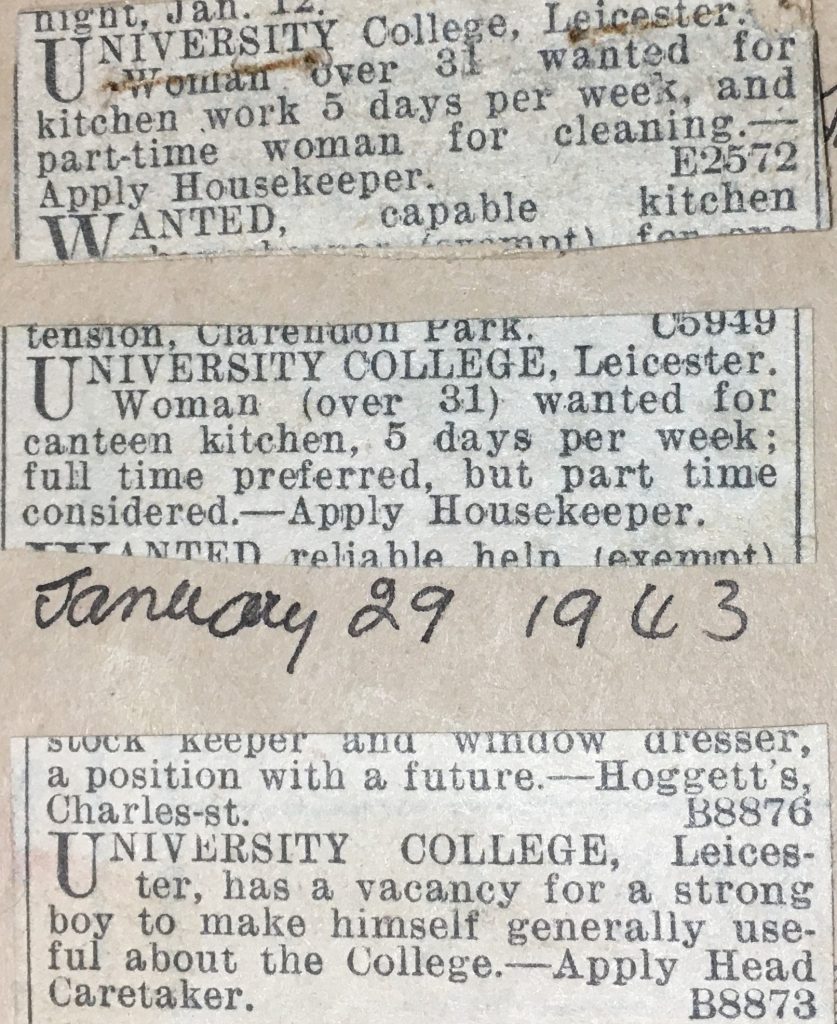The University Archives
The University Archives at the University of Leicester are, perhaps unsurprisingly, boxes and boxes of files relating to the history of the University of Leicester. Part are stored in the basement of the David Wilson building, in temperature and humidity-controlled secure storage, alongside collections of rare books and photographs, and contain papers from the founding of the University to the present day.
There is a huge amount contained within these boxes, and so for researchers to make the best use of them the archives are catalogued, and then the descriptions placed online, with descriptions listing what is in each file (a collection of papers) within each box.

My role
My role has been supported by the National Lottery Heritage Fund as part of the “So that they may have life ” project. As the University approaches its centenary, I have been lucky enough to be going through the papers we have from the very founding of the site as a place of education. I have been looking through the administrative papers relating to its founding, roughly up until the end of Frederic Attenborough’s role as Principle of the University (which he held from 1932 to 1951), and listing them individually to make them more usable for researchers. Listing the information involves reading through it, and filling in a spreadsheet explaining what each file contains, including picking out key names and dates.
The coronavirus pandemic has had a great impact on the project, as this listing was originally going to form the archive volunteer strand. This activity was stopped in March 2020 due to the national lockdown, and the money that would have been spent on volunteer travel expenses, hire of rooms, creating physical promotional material etc, was repurposed to create this opportunity for someone interested in a career in archives or heritage, to complete the listing. Special dispensation has been given to complete this work despite the third lockdown.
The collection that I am working with is held in a set of approximately fifty boxes, which we think were kept in alphabetical order of correspondent. There are a large number of files for subjects relating to the letters A (Advertising, Appeals and Attenborough) and B (Bequests, BBC, Botanic gardens), and far fewer for Z (Zoology) or S (Supplementary Clothing and Bread Coupons).
Rather than try and cover the vast amount contained within these collections in this blog article, I decided to narrow down my focus further, and to talk about what I discovered under the sub-series, advertising.
Advertising
Being presented by multiple folders full of information relating to advertising, much of it from nearly a century ago, was at first intimidating. I was new to archival listing at this point (Advertising being the first topic I came to in the alphabet), and had no idea of really what to expect.
I opened the first folder, and began to read. Before long I was utterly fascinated by what I was uncovering. There were three key areas that I wanted to talk about in this post – the information uncovered, the physicality of the files, and the humanity of them.
Information – First off, one of the major things that was revealed was the sheer level of information that the archive holds. Within the drafts of advertisements and the correspondence being written, you could uncover the newspapers that were being advertised in, fees that were being offered to staff (from professors to gardeners, clerks, cleaners and laboratory assistants), and explanations of which courses were being offered. This served to give a glimpse of the early history of the university, explaining what was needed in the set up. It also provided information about wider society at the time, with information about the University College being supplied to publications with names such as “The Yearbook of Universities of the Empire” and “Women’s Employment”.

Physicality – Alongside the vast amount that could be learned from the archive, I was also struck by the sheer physicality of what I was holding in my hands – pieces of paper that were often close to a century old. The papers came in a vast number of different textures, from the translucent flimsy copies created for use with typewriters, to the thick and highly illustrated paper used in formal legal agreements. There were even occasional pieces of paper that had been secured by wax seals.
World War Two brought with it rationing, which led to arguments over column inches, and advertisements being rewritten to meet strict word-requirements. Due to the shortage of paper, letters from this period are often on the back of already-used sheets, with that information scribbled out.
At a time before word-processors, when any error meant that the page needed to be written out again, it is common to find pages that have been corrected by hand – either to be retyped, or else sent with minor corrections. I found myself smiling at a piece that read. “I apologise for any trouble that you have caused”, with a pencil note on top adding in the missing ‘been’.
Humanity – Stories such as that typo bring me on to the sheer humanity that shines through in these papers. Often, the writing is formal – after all, these are to do with the founding of the university, and were within a professional environment. And yet moments of humour and humanity shine through. I found myself captivated by correspondence with an advertising agent desperately trying to entice the College into continuing to advertise with them, as the budget allocated to that publication slowly shrunk.
I was also struck by moments of history on those pages. A guest lecturer from the University of Jerusalem, speaking of “The Present World Situation and the Jews” during 1937, alongside lectures from the Eugenics Society. Appeals to the local community to provide lodgings for students who were veterans. The closure of parts of the college for the war, and age restrictions on cleaners being hired to try and ensure they wouldn’t be called up to serve.
The archives contain a great deal of information about the people whose lives they affected, and give clues to a broader understanding of the experience of the University College in the first thirty years or so of its existence.
All of this was contained within Advertising. Within the boxes for A, there is also information about Appeals, Attenborough’s personal correspondence, Academic staff, Agriculture courses, Adult Education, Avery Hill Training College, Air Raid Precautions, Accountants and Address Changes (these descriptions will all be available to view on the Archives & Special Collections catalogue, in due course). And then there is the rest of the alphabet.
The discoveries I have made, whilst small-scale, have given me an idea of the extent of work involved in the initial setting up of the university. They show moments of humanity, and emphasise the complexity involved, alongside the minutiae and realities of trying to set up what was first the Leicestershire and Rutland University College, then University College, Leicester, and now the University of Leicester.
This opportunity has helped me to understand the true value of archives, allowing glimpses of the past, and revealing information which I am sure will be useful to researchers in a wide range of researchers in the years (and indeed centuries) to come.
With grateful thanks to the East Midlands National Lottery Heritage Fund.
Jenni Hunt, Temporary Archive Assistant, “So that they may have life”.